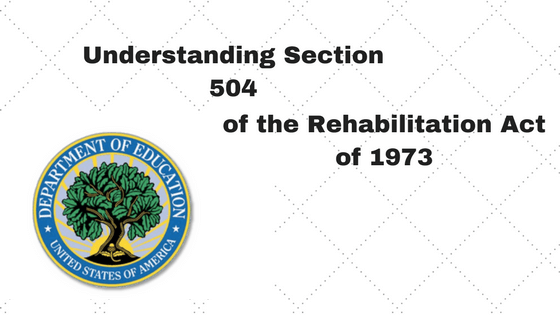A Guide to Understanding Section 504 of the Rehabilitation Act of 1973
Written by Preet Mankad
Published on January 30, 2017
The U.S. Department of Education, Office of Civil Rights has published a new resource guide:
Parent and Educator Resource Guide to Section 504of the Rehabilitation Act of 1973. The main aim of the guide is to help students with disabilities and their parents and teachers understand disability rights under federal law and specifically the Rehabilitation Act of 1973.
The guide explains that the federal law defines a disability as “a physical or mental impairment that substantially limits one or more major life activities”. Reading and spelling problems like dyslexia qualify as a disability because reading and writing are major life activities, not only for school but also for the workplace and personal life.
The guide aims to help eliminate discrimination against students with disabilities by promoting an understanding of disability rights under federal law and by explaining what kind of assistance is available and how to seek help.
The guide stresses that students with dyslexia are eligible for modifications and assistance in a classroom setting even if they are getting good grades:
“A student who has dyslexia and is substantially limited in reading finds it challenging to read the required class material in a timely manner. …..[T]he student spends far more time preparing for class than other students and earns good grades because of the student’s intelligence and extreme efforts. The student would still be substantially limited in the major life activity of reading despite earning good grades and may require a multi-sensory approach to learning, and additional time to complete in-class tests or quizzes, even if that student earns mostly A’s.” (p. 5)
Especially in students who are earning good grades, it can be difficult to observe the language processing impairments that underlie dyslexia. A specific language-literacy assessment is needed to describe and document this type of impairment and its impact.
Lexercise therapists work directly with the family, providing assessments and effective, research-based intervention, as well as information and support for appropriate school accommodations.
If you aren’t sure if your child has dyslexia, take our free, online dyslexia screening test.
Improve Your Child’s Reading
Learn more about Lexercise today.
Schedule a FREE
15-minute consultation


